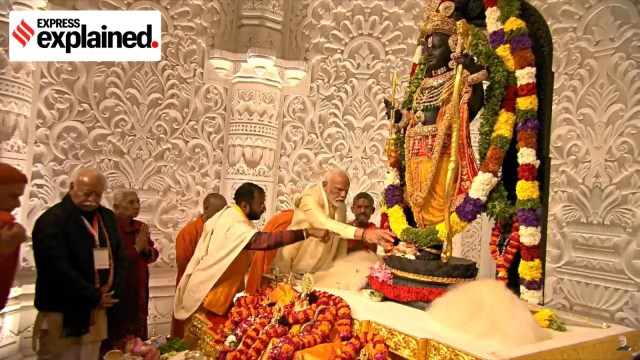4 out of 5 Indians want their national leader to share religious beliefs with them: what Pew study found
The Pew Research Center studied public attitudes about the religious qualities of national leaders in 35 countries around the world. Here is what it found.
 Prime Minister Narendra Modi praying at the Ram Temple in Ayodhya during its inauguration. (Express Photo)
Prime Minister Narendra Modi praying at the Ram Temple in Ayodhya during its inauguration. (Express Photo)Analysis by the Pew Research Center, which was published last week, explored public attitudes about the religious qualities of national leaders in 35 countries around the world. The sample comprised more than 53,000 respondents, who were interviewed telephonically.
Here are the study’s key takeaways.
- 01
Leaders who stand up for people with your religious beliefs
81% Indians said it is very/somewhat important for the country’s leader to stand up for people with the same religious beliefs as them.
This was the 5th highest among surveyed countries behind Indonesia (90%), Bangladesh (89%), Philippines (88%), and Malaysia (82%).
Only 25% of French people said it is important for their country’s leader to do so — lowest among the countries surveyed.
The 35-country median for this preference was 63%.
- 02
Leaders who have strong religious beliefs, even if they are different from your own
79% Indians said it is very/somewhat important for the country’s prime minister to hold strong religious beliefs, even if they differ with their own.
This was 4th highest among surveyed countries behind Indonesia (86%), Philippines (86%), and Kenya (80%).
Only 6% of Swedish people said it was important for their country’s leader to hold strong religious beliefs — lowest among the countries surveyed.
The 35-country median for this preference was 45%.
- 03
Leaders who have religious beliefs that are the same as your own
81% Indians said it was very/somewhat important for the country’s leader to have the same religious beliefs as them.
This was 4th highest (tied with Malaysia) among surveyed countries behind Bangladesh (91%), Indonesia (90%), and Philippines (86%).
Only 12% of Swedish people said it was important for their country’s leader to have the same religious beliefs as them.
The 35-country median for this preference was 42%.
- 04
How respondent’s religiosity impacts the above preferences
In general, people who say religion is important in their lives are more likely than others to say it’s important for their country’s leader to stand up for people with their religious beliefs.
For instance, 84% of Indians who said religion was very important in their lives said that they would want such a leader compared to 67% of Indians who said religion is less important to them.
This contrast is most striking in the case of Australia — 87% religious Australians wanted a leader who would stand up for people with their religious beliefs, compared to 40% of Australians who said religion is not as important in their lives.
- 05
How respondent’s religious affiliation impacts the above preferences
Globally, responses varied based on religious affiliation. In India, however, the difference between Hindus and Muslims — who together make up over 90% of the population — was negligible. 82% Hindus wanted a leader who stood up for people with their religious beliefs compared to 78% Muslims.
- 01
- 02
- 03
- 04
- 05






































